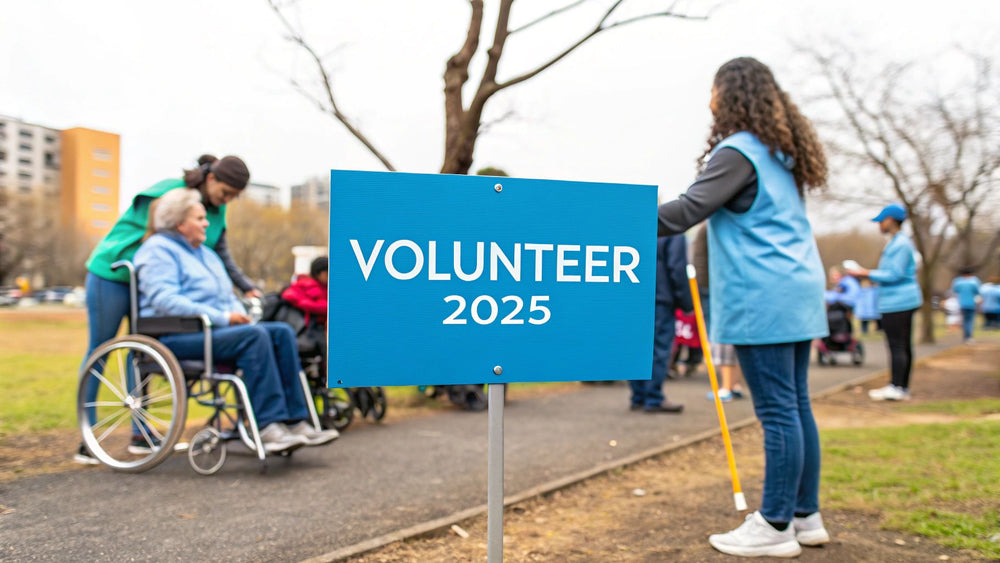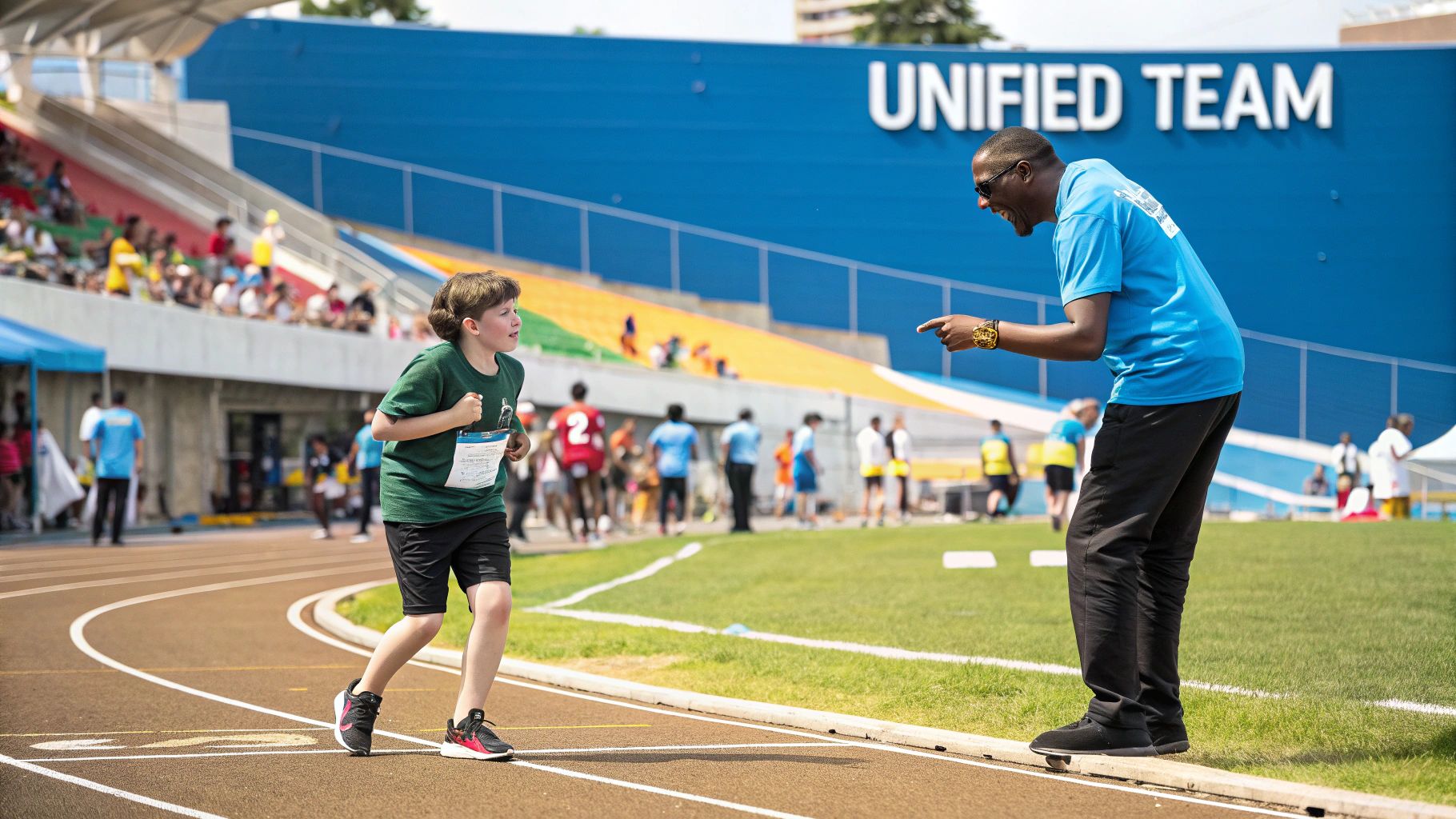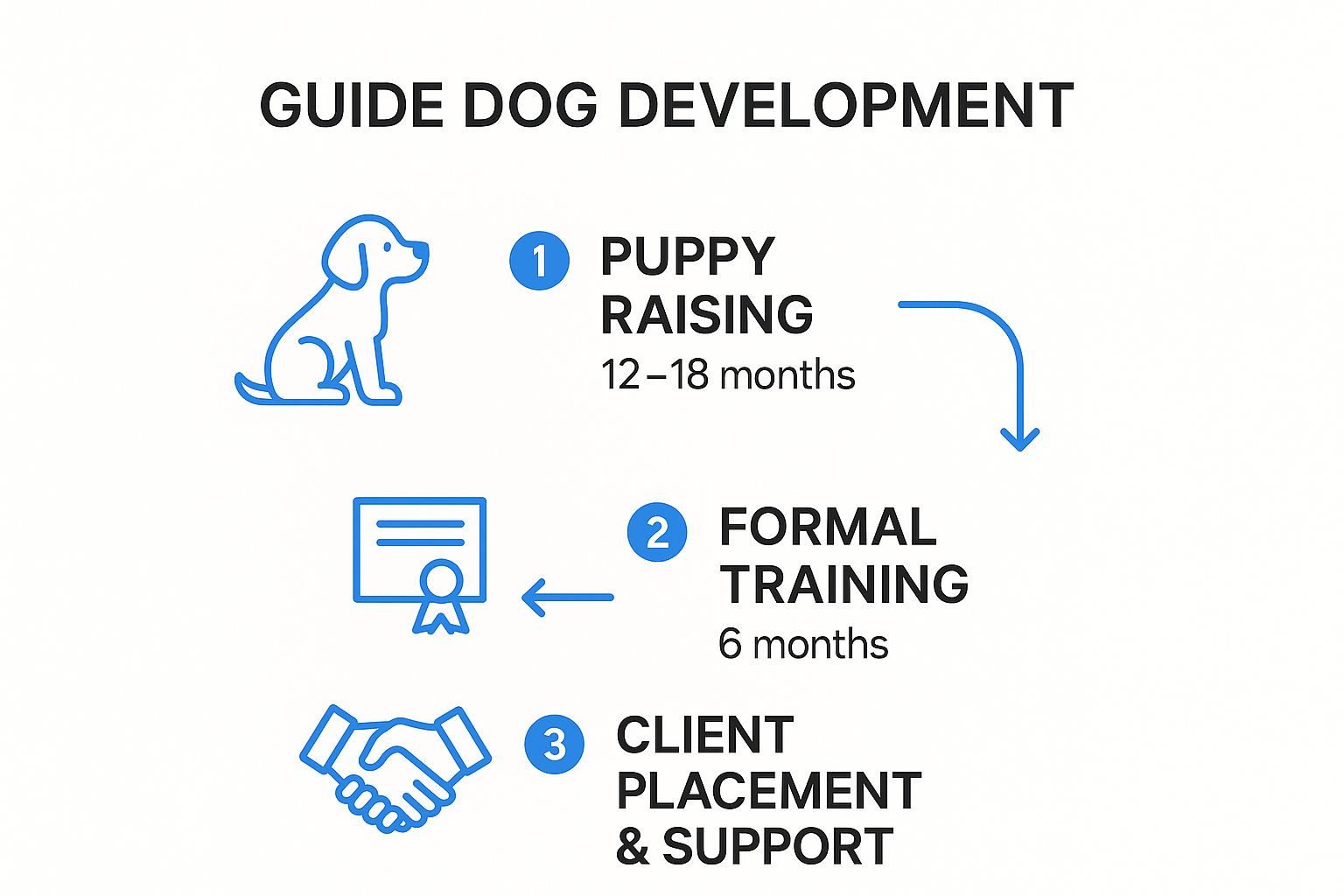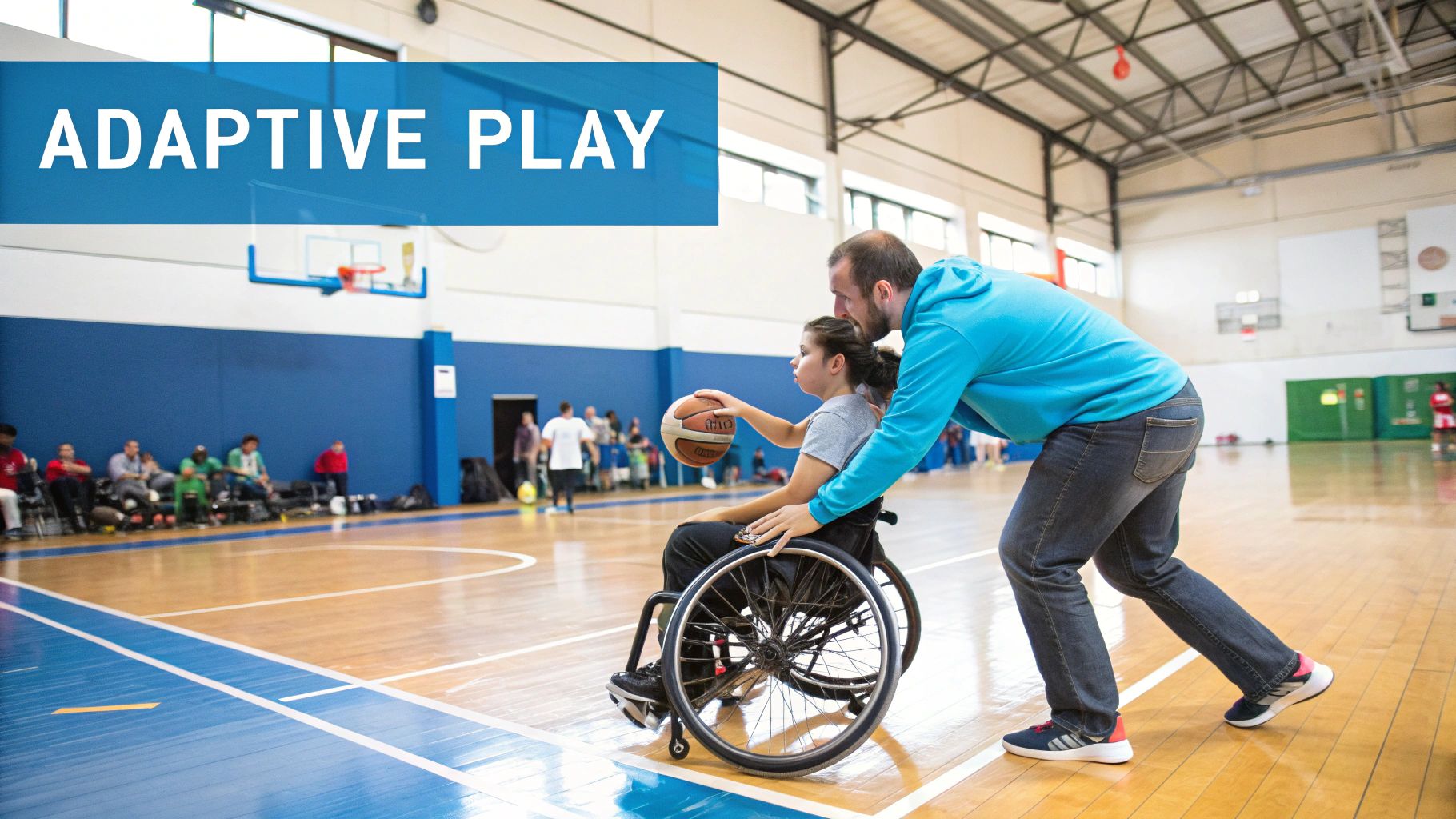Top 6 Ways to Find Volunteer Work for the Disabled in 2025

Volunteering is more than just donating time; it’s about forging connections, fostering independence, and building a more inclusive community. For individuals with disabilities, dedicated volunteers can be the key to unlocking new experiences, developing skills, and achieving personal goals. Many assume that volunteer work for the disabled requires specialised medical training, but the reality is far more accessible. The most impactful opportunities often revolve around shared interests, companionship, and practical support that directly enhances a person's quality of life.
Whether you're coaching an adaptive sport, assisting with technology, or helping someone navigate their community with confidence, your contribution helps dismantle barriers. Your time and energy help create a world where everyone belongs and has the chance to thrive.
This guide explores six distinct and impactful avenues for volunteering, offering practical steps and insights to help you find the perfect role. We'll delve into specific organisations and the skills you can bring, showing how direct, human-to-human connection makes a profound difference. This article will provide you with clear, actionable ideas to get started, from supporting athletes at the Special Olympics to helping train guide dogs that provide life-changing mobility and companionship.
1. Special Olympics Volunteering
Special Olympics is a renowned global movement dedicated to empowering children and adults with intellectual disabilities through the joy of sport. This organisation provides year-round training and athletic competitions across a wide variety of Olympic-style sports, fostering physical fitness, courage, and meaningful social connections for its athletes. Volunteering with Special Olympics is a powerful way to directly contribute to a more inclusive and accepting world.

This type of volunteer work for the disabled goes far beyond just helping on game day. Volunteers are the backbone of the organisation, filling crucial roles that range from coaching and officiating to managing events, fundraising, and providing administrative support. The impact is significant; founded in 1968, the program now serves over 5.7 million athletes worldwide, with corporate partners like Coca-Cola and Toyota helping to make it all possible.
How to Get Involved
Engaging with Special Olympics is a structured and rewarding process. The organisation offers diverse roles to match your skills, availability, and interests.
- Find Your Local Program: Start by visiting the Special Olympics Australia website to locate the program or club nearest to you. Local coordinators are your best resource for understanding specific community needs.
- Event-Based Volunteering: If you're new to volunteering, consider a one-day role at a local or state-level competition. This is an excellent way to experience the energy and spirit of the games without a long-term commitment.
- Ongoing Roles: For those looking for deeper involvement, roles like coaching, team management, or committee membership offer a chance to build lasting relationships and see athletes develop their skills over time.
Key Insight: The Unified Sports program, which joins people with and without intellectual disabilities on the same team, is a fantastic example of inclusive community participation. It breaks down barriers and builds friendships through shared training and competition.
This model of bringing people together is a cornerstone of effective community engagement. You can explore more on the importance of this kind of involvement with our guide to community participation and the NDIS. By focusing on encouragement, positive reinforcement, and celebrating every effort, you can help create an environment where athletes feel valued and empowered to achieve their personal best.
2. Guide Dog Training and Mobility Assistance
Organisations dedicated to training guide dogs provide life-changing mobility and independence for people who are blind or have low vision. These highly specialised assistance animals are trained to navigate obstacles, stop at kerbs, and follow complex commands, enabling their handlers to travel safely and confidently. Volunteering with a guide dog organisation is a deeply rewarding form of volunteer work for the disabled, offering a chance to be part of an incredible journey from playful puppy to trusted companion.
This work involves much more than just dog training; it's about empowering people. Volunteers are integral to the success of these programs, which have a long and storied history. For instance, The Seeing Eye, founded in 1929 by Dorothy Harrison Eustis after being inspired by Morris Frank and his dog Buddy, has placed over 17,000 guide dogs. Similarly, organisations like Guide Dogs for the Blind serve thousands of clients across North America, often providing their services entirely free of charge thanks to community support.
How to Get Involved
Becoming a part of a guide dog's journey is a structured process with various levels of commitment to suit your lifestyle and availability.
- Become a Puppy Raiser: This is one of the most hands-on roles. Volunteers take a puppy into their home for 12-18 months, providing a loving environment while teaching basic obedience and socialising the pup in various public settings. This foundational experience is crucial for their future success.
- Attend an Information Session: Before committing, attend an official information session. These meetings provide a comprehensive overview of the responsibilities, expectations, and support systems available to puppy raisers.
- Consider Other Roles: If raising a puppy isn't feasible, you can contribute in other ways. Many organisations need temporary foster homes, administrative support, or volunteers for fundraising events. Fostering a "career-change" dog, one that didn't complete the guide dog program but still needs a loving home, is another valuable option.
Key Insight: The success of a guide dog hinges on early socialisation and consistent, positive training. The puppy raising phase is not just about house-training; it’s about exposing the dog to the sights, sounds, and experiences of the world in a controlled and positive way to build a confident, unflappable temperament.
The journey of a guide dog from birth to placement is a carefully managed process, as illustrated in the flow chart below.

This visualisation highlights how the initial 12-18 months of care from a volunteer puppy raiser provides the essential foundation for the more intensive, specialised training that follows. For those interested in the foundational steps of training these invaluable companions, you can learn more about Mastering Labrador Retriever Puppy Training. Successfully completing this volunteer phase is a critical first step in creating a partnership that will grant someone newfound freedom.
3. Adaptive Sports and Recreation Programs
Adaptive sports and recreation programs are designed to modify traditional sports so that individuals with physical, sensory, or cognitive disabilities can participate fully. These programs create opportunities for people to engage in activities ranging from wheelchair basketball and adaptive skiing to therapeutic horseback riding and Paralympic-level sports. Volunteers are the lifeblood of these initiatives, enabling participants to improve physical health, build confidence, and forge strong community connections.

This form of volunteer work for the disabled is about facilitating empowerment through activity. The impact of these programs is immense, with organisations like the Challenged Athletes Foundation having awarded over $134 million in grants to help athletes access adaptive equipment and training. Volunteers fill diverse and essential roles as coaches, equipment managers, event coordinators, and supportive companions, making sport accessible to everyone.
How to Get Involved
Getting involved with adaptive sports is a direct way to share a passion for activity and inclusion. Organisations are always looking for dedicated individuals to help run their programs smoothly and safely.
- Connect with Local Clubs: Start by searching for adaptive sports clubs or organisations in your area. Disability Sports Australia is a great national body that can often point you toward state-level and local groups seeking volunteers.
- Offer Your Skills: Whether you have a background in a specific sport, first aid, or just great organisational skills, there is a role for you. Be clear about your strengths and availability when you reach out.
- Undergo Training: Most reputable organisations provide disability awareness training to ensure volunteers can offer support safely and respectfully. This often includes learning correct terminology, safe transfer techniques, and how to adapt communication styles.
Key Insight: The core principle of adaptive sports is to focus on a person's abilities, not their limitations. By adapting rules and equipment, these programs shift the focus to what participants can do, fostering an environment of achievement, determination, and mutual respect.
This philosophy of adapting activities to ensure everyone can participate is crucial for social and personal development. You can explore more about the benefits with our guide to inclusive activities and developing social skills. As a volunteer, your role is to champion this positive approach, encouraging participation while always respecting an individual's comfort levels and goals.
4. Assistive Technology Support and Digital Accessibility
In our increasingly digital world, technology is a key that unlocks independence, communication, and opportunity. For people with disabilities, assistive technology (AT) is often the bridge to full participation. These programs focus on helping individuals access and effectively use tools like screen readers, voice recognition software, adaptive keyboards, and mobile accessibility features. Volunteering in this space provides crucial technical support, training, and digital literacy education.
This type of volunteer work for the disabled is about empowering people through technology. Volunteers can demystify complex software and hardware, making it approachable and useful for daily life. The impact is profound, as shown by organisations like the Assistive Technology Industry Association (ATIA) which coordinates programs, and the dedicated accessibility teams at tech giants like Apple, Google, and Microsoft. These efforts, popularised by advocates like Haben Girma, ensure technology is built and used inclusively.
How to Get Involved
Getting involved in AT support allows you to use your tech-savviness to make a direct and meaningful difference. Organisations often seek volunteers with patience and a passion for problem-solving.
- Connect with Specialised Organisations: Look for local or national non-profits that specialise in assistive technology. Many disability-specific organisations also run their own tech support and training programs.
- Offer Skills to Community Centres: Local libraries and community centres are often hubs for digital literacy. You can volunteer to run workshops or one-on-one sessions focused on accessibility features.
- Practise Patience and Clarity: Your role is to be a guide, not just an expert. Use clear, non-technical language and work at the individual's pace. The goal is to build confidence and independent skill.
Key Insight: True accessibility goes beyond the digital realm. When supporting events or programs, it is vital to consider all aspects of the environment. Beyond digital and technological solutions, ensuring physical accessibility is paramount. Volunteers assisting with events or programs for disabled individuals should be aware of essential facilities, such as consulting a guide to renting a portable toilet for disabled users to ensure inclusive environments.
By helping someone master a screen reader or set up voice commands on their smartphone, you are opening up new avenues for communication, education, and employment. You can learn more about how assistive technology enhances digital accessibility. Your contribution helps ensure that no one is left behind in the digital age.
5. Therapeutic and Service Animal Programs
Therapeutic and service animal programs play a vital role in enhancing the independence, safety, and emotional well-being of individuals with disabilities. These organisations train animals, most commonly dogs, to perform specific tasks that mitigate the challenges associated with a person's disability, from providing mobility support to alerting them to medical emergencies. Volunteering in this sector is a unique and deeply fulfilling form of volunteer work for the disabled.
These programs rely heavily on volunteers for a wide range of tasks. Roles can include being a "puppy raiser" who socialises and provides basic training for a future assistance dog, helping with kennel duties, assisting with fundraising events, or providing administrative support. The impact of these programs is immense; organisations like Assistance Dogs Australia and Guide Dogs Australia have placed thousands of highly trained animals, transforming the lives of their recipients by fostering greater community participation and confidence.
How to Get Involved
Becoming a volunteer with an assistance animal organisation is a significant commitment, but the process is designed to be supportive and clear. Your involvement directly shapes an animal's ability to one day support a person in need.
- Research Local Organisations: Begin by searching for accredited assistance animal programs in your state, such as Guide Dogs SA/NT or Assistance Dogs Australia. Each organisation has its own specific needs and application processes.
- Become a Puppy Raiser or Foster Carer: This is one of the most hands-on roles. It involves taking a puppy into your home for 12-18 months to provide love, socialisation, and basic training under the guidance of the organisation. It is a long-term commitment that is crucial to the dog's future success.
- Offer On-site or Event Support: If you cannot commit to fostering, many organisations need volunteers for on-site tasks like grooming, kennel cleaning, or helping at community awareness and fundraising events.
Key Insight: It's essential to understand the distinction between different types of working animals. Service or assistance animals are specifically trained to perform tasks for a person with a disability and have public access rights. Therapy animals provide comfort and emotional support in settings like hospitals or nursing homes but do not have the same public access rights.
Understanding this difference is crucial for volunteers, as it shapes the training protocols and the animal's ultimate role. By following the organisation's guidelines rigorously, you ensure the animal is prepared for its important work, helping to create a safer and more independent life for its future partner.
6. Employment and Life Skills Training Programs
Meaningful employment is a cornerstone of independence and self-worth, and programs focused on this area provide vital support for people with disabilities to achieve their career goals. These organisations offer comprehensive training in both job-specific competencies and broader life skills, creating pathways to sustainable employment and greater community integration. Volunteering in this capacity allows you to play a direct role in empowering individuals to build confidence and economic security.
This type of volunteer work for the disabled is about more than just finding someone a job; it’s about mentorship, skill-building, and advocacy. Volunteers are the heart of these programs, acting as job coaches, mentors, and instructors. Organisations like Goodwill Industries, which serves over 288,000 people with disabilities annually, and The Arc, with employment programs boasting high job retention rates, demonstrate the profound impact of this support. Volunteers help bridge the gap between a person's potential and an employer's needs.
How to Get Involved
Your professional experience and personal skills can be invaluable assets in an employment training setting. The process for getting involved is typically well-structured to match volunteers with roles where they can make the biggest difference.
- Connect with Local Providers: Seek out local disability employment services or organisations like Easter Seals, which has a presence in hundreds of communities. They can provide insight into the specific needs of job seekers in your area.
- Offer Your Expertise: You can volunteer as a mentor, a mock interviewer, or a workshop facilitator. Many programs need hands-on assistance, such as offering guidance on effective resume improvement strategies.
- Become a Job Coach: For more in-depth involvement, consider becoming a job coach. This role involves providing one-on-one support to a participant, helping them learn their tasks, navigate the workplace environment, and build lasting professional relationships.
Key Insight: The most successful employment support focuses on an individual's unique strengths and interests, rather than just filling a vacant position. By aligning a person’s passions with their job role, volunteers can help foster long-term career satisfaction and success, as championed by advocates like Temple Grandin.
This person-centred approach is critical for effective outcomes. You can explore how these principles are applied through government-funded initiatives by reading about NDIS employment support. By celebrating small victories and practising patience, you contribute to a supportive environment where participants feel empowered to overcome challenges and achieve their full potential.
Volunteer Work Programs Comparison Matrix
| Program | Implementation Complexity 🔄 | Resource Requirements ⚡ | Expected Outcomes 📊 | Ideal Use Cases 💡 | Key Advantages ⭐ |
|---|---|---|---|---|---|
| Special Olympics Volunteering | Moderate: training & background checks | Variable: time from 4 hrs events to weekly coaching | Increased athlete confidence, life skills, and social inclusion | Sports coaching, event support for intellectual disabilities | Direct impact, flexible roles, strong community |
| Guide Dog Training and Mobility Assistance | High: 12-24 month puppy raising & training | High: time, commitment, specialized training | Enhanced independence and mobility for visually impaired clients | Puppy raising, dog training, mobility instruction | Long-term impact, proven methods, strong volunteer network |
| Adaptive Sports and Recreation Programs | Moderate-High: requires adaptive knowledge & safety | Moderate-High: equipment, insurance, facilities | Improved physical fitness, mental health, social inclusion | Modified sports coaching, event coordination for disabilities | Promotes fitness, competitive pathways, community building |
| Assistive Technology Support and Digital Accessibility | Moderate: ongoing tech skill updates required | Moderate: devices, software, remote support | Increased independence in education, work, and daily tasks | Tech training, digital literacy, accessibility testing | Remote options, technical skill use, high demand |
| Therapeutic and Service Animal Programs | High: lengthy training, strict protocols | High: training costs, animal care, veterinary support | Independence and emotional support for disability types | Service/therapy animal training, fostering, handler education | Proven benefits, diverse volunteer roles, strong community |
| Employment and Life Skills Training Programs | Moderate-High: requires relationship building & knowledge | Moderate: time, expertise, partnerships | Economic independence, workplace skills, self-sufficiency | Job coaching, mentoring, life skills training for disabilities | Measurable outcomes, long-term mentoring, employer collaboration |
Taking the Next Step: How to Start Your Volunteer Journey
The journey to finding meaningful volunteer work for the disabled is as personal as it is rewarding. Throughout this guide, we've explored a wide spectrum of opportunities available right here in Adelaide and across regional South Australia. From the electric atmosphere of the Special Olympics and the quiet focus of Guide Dog training, to the innovative fields of assistive technology and the hands-on support in adaptive sports, the avenues for making a genuine impact are abundant and varied.
Each role, whether it's coaching a wheelchair basketball team, assisting with a therapeutic horse-riding program, or mentoring someone in digital literacy, contributes to a larger, more inclusive community fabric. The common thread weaving through all these opportunities is the power of human connection. It’s about sharing a skill, lending a hand, and most importantly, offering your time and empathy to foster independence and belonging.
Turning Inspiration into Action
Reflecting on the opportunities discussed, the path forward becomes clearer. The most effective volunteer experience is one that aligns with your personal interests, leverages your unique skills, and fits realistically within your lifestyle. Don't feel pressured to have specialised expertise; often, the most valuable asset you can bring is a positive attitude and a willingness to learn.
Consider these practical next steps to begin your journey:
- Self-Reflection: What are you passionate about? Are you an animal lover, a sports enthusiast, a tech wizard, or a natural mentor? Match your interests to the volunteer roles we've covered, such as therapeutic animal programs, adaptive sports, or digital accessibility support.
- Skill Assessment: What skills can you offer? Think beyond professional qualifications. Are you patient, organised, a great listener, or physically active? These qualities are immensely valuable in employment training programs and mobility assistance roles.
- Reach Out Locally: Start with a simple online search for organisations mentioned, like "Special Olympics South Australia" or "Guide Dogs SA/NT". Visit their websites, look for a "Volunteers" section, and don't hesitate to make a phone call or send an email to express your interest.
Your decision to engage in volunteer work for the disabled is more than just a donation of time; it's an investment in a more equitable and supportive society. It's a powerful statement that you believe in a community where everyone has the opportunity to participate fully and pursue their passions.
This commitment to fostering empowerment and connection is a principle we live by. The act of volunteering mirrors the core philosophy of dedicated disability support: it's about seeing the individual, understanding their goals, and providing the right support to help them achieve those goals. Whether you’re a weekend volunteer or a professional NDIS support worker, you are part of a vital network that champions dignity, independence, and community integration. Your contribution, no matter its form, helps build a stronger, kinder, and more accessible world for everyone.
At Vana Care, we build our NDIS support services on this same foundation of genuine partnership and shared interests. We connect NDIS participants in Adelaide and regional South Australia with dedicated support workers who not only provide exceptional care but also share their passions, helping them to live more independently and engage with their community. If you or a loved one are seeking personalised support, discover the difference a perfect match can make at Vana Care.


